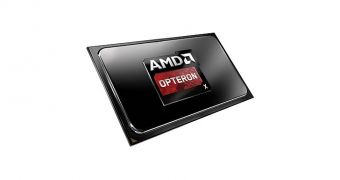Advanced Micro Devices has been trying to gain some ground on the enterprise computing and server industry, but its low support for Linux operating systems has held it back. It now has an APU that overcomes that limitation though.
The Sunnyvale, California-based company has introduced the second-generation Opteron X-Series APU, codenamed Berlin.
First off, the APU itself. It is called Opteron X-Series "Berlin," is a successor to the Opteron X-Series X2150 APU, and will be launched later this year. This is, unfortunately, all we actually know about it.
Maybe in a day or so we’ll know more, after AMD finishes demoing it on the HP Moonshot M700 Cartridge, as well as AMD's own SM15000 server.
The accelerated processing unit was shown fully capable of tuning a Linux environment based on the Fedora Project, a Red Hat-sponsored, community-driven Linux distribution.
This is the first Heterogeneous System Architecture (HSA) featured server APU and allows Java applications to take advantage of graphics processing units (GPUs).
We already know that the greatest asset of APUs and GPUs over CPUs is their significant parallel processing capability.
It is that parallel number crunching ability that the AMD APU will allow servers to fully use, at long last.
All this might sound familiar because AMD talked about this before, when it introduced the concept and called it "Project Sumatra."
No doubt, the company hopes that enterprise customers and data center builders will more readily integrate APUs and professional graphics cards in future installations.
Multimedia workloads are pegged as some of the workloads most likely to benefit from this, but so are general purpose GPU compute operations.
Advanced Micro Devices hasn't yet demonstrated OpenGL and OpenCL on the "Berlin," but it intends to do so in the near future.
"As servers adapt to new and evolving workloads, it's critical that the software ecosystem support the requirements of these new workloads," said Suresh Gopalakrishnan, corporate vice president and general manager of the server business unit, AMD.
"We are actively engaged with a broad set of partners in the data center software community who are bringing to market the software infrastructure to seamlessly enable x86 APU based servers."
Clearly, AMD wants to finally carve a slice of the enterprise, server and data center industries, a sector that has mostly been owned by Intel's x86 Xeon line so far.
As for the physical side of things, the APU is (or will be) a pretty standard-looking, rectangular chip with a black IHS (integrated heatsink) and the Opteron logo on top.

 14 DAY TRIAL //
14 DAY TRIAL //